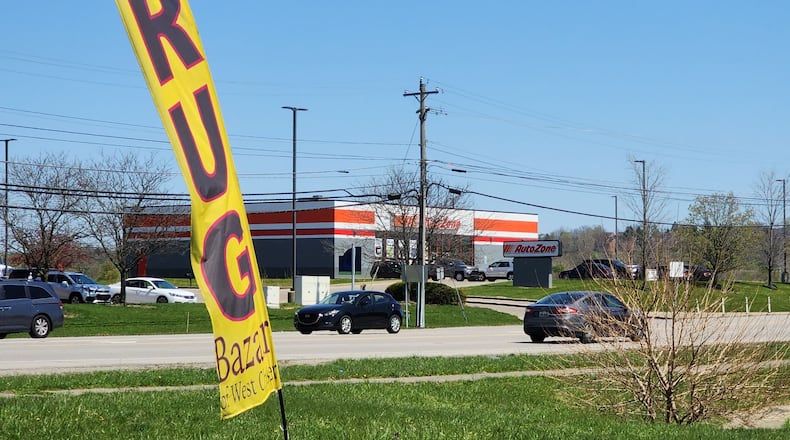“Most businesses, we call them once and they stop doing it. Rug Bazaar was just insistent that they were going to continue to do it no matter what we did to them, from a zoning violation letter side,” Wiegand told the trustees before they officially approved the settlement agreement. “Court is an extreme action on our side — we don’t do it a ton.”
There is another settlement on the trustees agenda for Tuesday involving illegal signs with Kings Furniture & Mattress, but no other information was available on that agreement. The township was asking the court for a $500 per day fine for each day they are in violation.
Credit: Nick Graham
Credit: Nick Graham
Wiegand said it’s not just the “aesthetics” but they can clog storm drains and “most importantly there is equity among all the businesses in West Chester that play by the rules and do not take those advantages that others do.” He told the Journal-News the signs can give scofflaws a competitive advantage.
According to court documents, the township started getting complaints about the signs in November 2019 and contacted Rug Bazaar owner Harry Forouz. After more complaints and more letters sent to Forouz they filed a complaint in Area III Court in April 2021. He plead no contest and paid the $250 fine, according to court records.
The signs started popping up again, so the township filed more complaints in Area III Court, to no avail. They took it to Common Pleas Court in November 2021. After the lawsuit went unacknowledged by Forouz for two months the township asked the court for a default judgement. Judge Greg Howard granted the permanent injunction against sign posting and ordered Forouz to pay $11,500 in February 2022.
After much legal wrangling, the two sides settled for a $2,000 fine and a permanent injunction against placing illegal signs. Forouz is allowed to place one “feather” flag within 75 feet of his front door from 9 a.m. Thursday through 9 p.m. Sunday.
“Our end goal is never monetary, our end goal is compliance...,” Wiegand told the Journal-News. “The reason we utilize penalties is frankly because the financial side tends to grab the violator’s attention.”
Forouz told the Journal-News a miscommunication led to the default judgement, and he doesn’t understand why they targeted him when there are signs and flags like his all over the township.
“If there is any courtesy you are giving to them, apply that to me too,” he said.
“I’m actually looking for a place to move out ... because they put me through hell these three years I’ve been here,” Forouz said.
Director of Public Information and Engagement Barb Wilson said, “others do illegally place signs, but in most cases the township has worked with them and gained compliance. All other efforts to stop Rug Bazaar and Kings from illegally placing signs were unsuccessful, therefore legal action was pursued.”
Wiegand said the primary reason for sign enforcement is placards placed in the right-of-way can cause safety hazards in terms of sight distance and certain signs — because of the metal stakes — can also cause damage to vehicles.
People are never allowed to post temporary signs in the right-of-way and permits — which are free — are required in order to post them. The permits are required so the township can ensure they are posted in the appropriate location and don’t become permanent.
Wiegand said it’s not like staff are combing the streets for sign violators, and taking people to court is rare.
“It’ll look like we have a lot because two of them came one right after the other,” Wiegand said. “But these are very unique examples, most businesses after we inform them of the regulation and ask them to please refrain from placing signs in these particular locations, almost all of them understand and come into compliance.”
It is also illegal to post signs on utility poles, but Casey Kroger, senior communications manager for Duke Energy, said “the company, to date, has not fined or pressed charges for unauthorized signage improperly or illegally attached to its poles.”
About the Author


